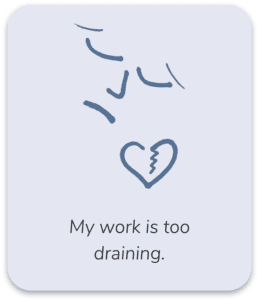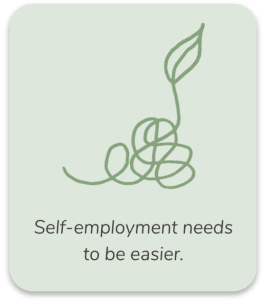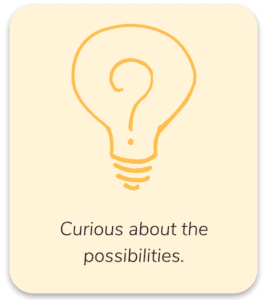
Many people in healthcare have sadly left the field or are still considering leaving. It’s a big decision and I want to offer something especially for stressed introverts in healthcare.
I invited a former doctor to share her experience and advice for others considering this career transition.
Welcome, Charity Hix, MD, as a guest writer on the blog. Charity is a Physician Burnout and Wellness Coach for Introverts in Healthcare.
Article by Charity Hix, MD
According to Definitive Healthcare, more than 145,000 healthcare professionals left medicine between 2021 and 2022 [source]. Are you one of those waiting in the wings, questioning whether you should be quitting, too?
Are you wondering if you should stay or go? If so, I wrote this for you.
Introverts have numerous beneficial traits that allow them to excel in patient care. Unfortunately, the business of medicine has altered the delivery of patient services.
Introverts find themselves stuck in the middle, dedicated to their patients, yet feeling overwhelmed in a system that’s becoming less and less introvert-friendly.
How do I know? I’m a full-on introvert who spent many years in medicine trying to balance my needs as an introvert with the demands of the healthcare system. While I love helping people, medicine didn’t always let me do it in a way that felt good to me.
That’s why I knew early in my career I wouldn’t be in medicine forever, but didn’t have much of a plan beyond that.
After a decade in healthcare, I began experiencing symptoms of burnout. This made deciding my future plans feel more urgent. Even so, I took my time, made positive changes in my existing role, and gave myself room to explore what the future might hold.
I want to share some of the process I used with you.
As a healthcare professional, you’ve invested mightily in your education and training. As an introvert, you’ve also made a significant emotional contribution to your career and patients.
Is that a reason to stay? No, but it is a reason to earnestly consider your current circumstances and what you want from your career before walking away.
How to Begin When Considering Career Change
1. Create Awareness
As an introvert, you know the value of paying attention to your intuition and energy. Take a few moments to consider how you feel at the end of each day.
Track your daily activities and notice which parts of your day allowed you to feel engaged or energized and which did not. Monitor this for a few weeks.
Remember that you will never love every part of your job, so start by creating awareness.
Knowing your starting point makes it much easier to get what you want. From this standpoint, you can become curious and start asking questions that shine a light on your career goals.
Here are some things to consider:
- Notice which tasks deplete you. Track how much of your time you spend in anxiety, frustration, or boredom.
- Don’t forget to also pay attention to the parts of your job that light you up.
- When do aspects of your career align with your values? When do they not?
- What about your job do you never want to give up and what feels like torture?
These questions can sometimes feel a bit daunting, especially if you’ve felt stuck for an extended period.
When I started to get serious about deciding whether to stay or go in medicine, I wasn’t sure where to start.
Enlisting the help of a coach gave me direction. More importantly, I felt validated working with someone who had decided to leave medicine. She didn’t sway my decision one way or the other, but she created a safe place for me to explore and find my own answers.
2. Experiment Where You Are
Once you’ve clarified the pros and cons of your current role, use your superpowers as an introvert. Get curious. You can come up with strategies to better align your current role with your needs and wants. Experiment.
What does that entail?
- Perhaps that means adjusting your physical environment to better suit your need for calm and quiet. If that’s unrealistic, maybe you can arrange to work from home on certain days so you can spend more time in spaces you’ve already designed to suit your nervous system.
- Reviewing your schedule with the intent to experiment may help you find new ways to adjust exam types or patient flow to create increased ease in your day.
- You may find that investing time in the creation of protocols for routine tasks results in increased efficiencies, which in turn leads to more white space in your day.
While I was experimenting in my existing role, I enlisted the help of my technicians to ensure every exam room was set up the same and items for resupplying the rooms were immediately nearby. It was a simple shift that I had shockingly never thought of before.
These simple tweaks saved me much time and frustration. The impact on my day far outweighed the minimal effort it took to put my plan in motion.
As I did, you may find that taking advantage of your natural tendency to investigate alternative approaches, along with experimenting, allows you to create more and more ease in finding new solutions to chronic problems.
As you start to make changes, choose a timeframe that allows you to adequately assess the feasibility of your options, but not so much time that you’re keeping yourself stuck in a no-win situation.
The key here is to close the gap between your ideal and reality. When the gap is small, it makes sense to stay. When the gap is a canyon, it makes sense to consider going.
What to Do If It’s Time to Quit Medicine
Clarity is a beautiful thing.
If you’ve been able to create shifts that make you feel good about staying in your current situation, great! More than great!
If you’ve discovered you’re in the wrong place, that’s good news, too. Now, you can decide how to move on.
Remember, it took years for you to get where you are. Give yourself the gift of not rushing into something new just to get away from the old.
I made several positive changes in my career before finally deciding to leave. When the day came to go, I was pulled forward by the excitement of what was next rather than repelled by what was.
Let yourself be drawn toward something that feels good for you.
Again, start exploring.
Medicine may still be your dream career, and you simply need to find an environment that’s better suited to your unique style.
Or you may need to adjust how much time you spend in medicine versus other pursuits that may or may not support you financially. New medical models are emerging in the face of widespread dissatisfaction. One of them could be right for you.
Many medicine-adjacent careers present new opportunities and welcome the skills and knowledge of introverts in healthcare.
Research and learn. We are lucky to have multitudes of information and the ability to connect at our fingertips. Give yourself time to dig in and see what options align with your values, unique needs, and sensitivities.
Finally, release yourself from the sunk cost fallacy, which may oblige you to stay simply because you’ve already invested significantly in medicine. Regardless of the number of years spent in training, if you conclude that medicine isn’t your calling, it’s OK.
Despite how it may feel, medicine isn’t your only skill. You have a broad range of skills that can translate into fields outside of medicine. A quick search on networking sites will provide ample examples of healthcare professionals using their talents in unique and creative ways that have nothing to do with medicine.
Your imagination is your only limit.
Summing It Up
- You don’t have to stay stuck. With some adjustments, you may find yourself excited by medicine again. Or, you may find, as I did, it’s time to go. Neither is right or wrong.
- Let your values and strengths be your guides. Use your powers of intuition, deep research, and analytical thinking to explore and experiment within your current situation and beyond. Enlist help when roadblocks pop up.
- The dedication and perseverance that helped you succeed in medicine can be the catalysts that move you toward a career of greater satisfaction. Take those qualities and use them to support yourself as you honor your needs. When I did this, I easily made the right choice for me. There was no worry, guilt, or regret. There was just forward momentum.
About Charity Hix, MD, the author
Charity is a burnout and career wellness coach for introverts in healthcare. She guides introverts in medicine off the spiral of career dissatisfaction by helping them honor and prioritize themselves, create sustainable energy, and drop the guilt over wanting something better.
Charity provides bespoke 1:1 coaching for introverts who are experiencing burnout or contemplating an exit from medicine. Learn more at www.charityhix.com. Psst, her blog is full of great ideas for you.
Related Posts
- Introvert/HSP Business Owner Profile: Hannah – Herbalist, Farmer, Wellness Professional
- Having a Big Heart Can Also Mean Big Exhaustion. Start with Grounding.
- Burnout prevention starting place (Been there. Please avoid.)
- 50+ Career Alternatives to Being a Therapist If You Enjoy Psychology But Dread Burnout





